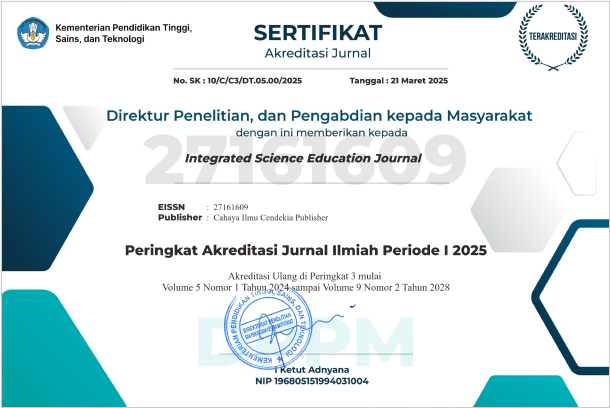Description of Science Process Skills of Physics Education Students of Jambi University on Refraction Material on Concave Lenses Using E-Module
Abstract
Purpose of study: This study was conducted to determine the science process skills of physics education students for refraction material on a concave lens. The questions discussed in this study are to describe the basic and integrated science process skills of Jambi University physics education students, what are the obstacles faced when the implementation of the e-module basic physics practicum II is applied, what are the solutions to the obstacles faced.
Methodology: This study uses a quantitative approach with descriptive methods. This research was conducted in the Physics Education Laboratory of the Teacher Training and Education Faculty, Jambi University. The sample l in this study were 40 physics education students contracting basic physics II subjects. The sampling technique used in this study was a total sampling technique.
Main findings: With the use of a Manual for Basic Physics 1 practicum in the form of e-module, it can improve students' science process skills. It can be seen from the research results, that the science process skills of physics education students at Jambi University on refraction practicum material on concave lenses
Novelty/Originality of this study: With this research, students are motivated to improve science process skills so that they become more active and more familiar with the concept of learning and can improve learning outcomes. Through this research, students can become more innovative and creative teachers, and can also find out the extent of students' science process skills.
References
Tanti, U. Rahmi, and H. Samparadja, “Pengaruh Model Problem Based Learning Terhadap Kemampuan Pemecahan Masalah Matematis Siswa Kelas Vii Smp Negeri 14 Kendari,” J. Chem. Inf. Model., vol. 8, no. 2, pp. 1689–1699, 2020, doi: 10.1017/CBO9781107415324.004.
Haryanto, Harizon, and N. K. Rantih, “Pengembangan Instrumen Penilaian Keterampilan Proses Dan Sikap Ilmiah Pada Materi Termokimia Kelas Xi Mia Sma Negeri 10 Kota Jamb,” J. Indo. Soc. Integ. Chem., vol. 8, no. 1, p. 21=53, 2015.
M. D. W. Ernawati, Haryanto, and S. C. Nababan, “Analisis Penerapan Model Pembelajaran Kooperatif Numbered Head Together (Nht) Dan Pengaruhnya Terhadap Hasil Belajar Siswa Pada Materi Struktur Atom Di Kelas X Smkn 3 Kota Jambi,” J. Ind. Soc. Integ. Chem, vol. 9, no. 1, pp. 45–53, 2017.
C. J. M. Maguil and Ismawan Prasetia Devi, “A New trend in understanding students’ interest in learning science: microetnography,” Integr. Sci. Educ. J., vol. 1, no. 2, pp. 62–66, 2020, doi: 10.37251/isej.v1i2.72.
N. Kurniawan and N. Nurlaili, “Kedisiplinan siswa terhadap objek mata pelajaran IPA di SMP Kabupaten Muaro Jambi,” Integr. Sci. Educ. J., vol. 1, no. 2, pp. 56–61, 2020, doi: 10.37251/isej.v1i2.73.
G. Nugroho, “Analisis motivasi belajar siswa pada pembelajaran IPA di SDN 16/ii Sepunggur,” Integr. Sci. Educ. J., vol. 1, no. 2, pp. 67–71, 2020, doi: 10.37251/isej.v1i2.67.
B. Asfadi, U. Yelianti, and R. S. Budiarti, “Pengaruh Model Pembelajaran Berbasis Masalah (Problem Based Learning) terhadap Hasil Belajar Biologi Siswa Kelas X SMA N 3 Kota Jambi,” Biodik, pp. 1–8, 2014.
R. Dewi, R. S. Budiarti, and M. Aina, “The Development Of Learner Activity Sheet- Carged Character Education With A Learning Model Of Guided Inquiry On Material Of Bacteria For Students Of Class X High School,” Biodik, vol. 3, no. 1, pp. 17–26, 2017.
Paino and W. Desmawan, “Analisis sikap siswa pada pembelajaran IPA di SDN 124/VIII Sidorejo Kabupaten Tebo,” Integr. Sci. Educ. J., vol. 1, no. 2, pp. 51–55, 2020, doi: 10.37251/isej.v1i2.75.
S. Wati, “Peran Guru Kelas Dalam Meningkatkan Pemahaman Siswa Pada Pembelajaran IPA Melalui Pembelajaran Berbasis Etnosains,” Integr. Sci. Educ. J., vol. 1, no. 2, pp. 46–50, 2020, doi: 10.37251/isej.v1i2.78.
Tanti, H. Isnadi, and Maison, “Konstruksi dan Validasi Bahan Ajar Fisika Berbasis Problem-Based Learning (PBL) untuk Meningkatkan Keterampilan Generik Siswa,” J. Teach. Learn. Phys., vol. 5, no. 1, pp. 28–34, 2020, doi: 10.15575/jotalp.v5i1.6635.
Maison, Astalini, D. A. Kurniawan, and S. Lintang Rofiatus, “Deskripsi Sikap Siswa Sma Negeri Pada Mata Pelajaran Fisika Student’s,” EduSains, vol. 10, no. 1, pp. 160–167, 2018.
Tanti, Maison, A. Mukminin, Syahria, A. Habibi, and Syamsurizal, “Exploring the relationship between preservice science teachers’ beliefs and self-regulated strategies of studying physics: A structural equation model,” J. Turkish Sci. Educ., vol. 15, no. 4, pp. 79–92, 2018, doi: 10.12973/tused.10247a.
Tanti, D. A. Kurniawan, R. Perdana, and O. H. Wiza, “Comparison of Student Attitudes Toward Natural Sciences in Rural Middle Schools in Jambi Province,” Ta’dib, vol. 23, no. 1, p. 63, 2020, doi: 10.31958/jt.v23i1.1607.
E. Sulistiani, R. S. Budiarti, and Muswita, “Analisis Kemampuan Berpikir Kritis Siswa Lintas Minat Pada Pembelajaran Biologi Kelas X SMAN 11 Jambi,” Biodik, vol. 2, no. 1, pp. 13–19, 2016.
K. Hardiyanti, Astalini, and D. A. Kurniawan, “Sikap Siswa Terhadap Mata Pelajaran Fisika Di Sma Negeri 5 Muaro Jambi,” J. Edufisika, vol. 3, no. 2, pp. 1–12, 2018.
P. Turiman, J. Omar, A. M. Daud, and K. Osman, “Fostering the 21st Century Skills through Scientific Literacy and Science Process Skills,” Procedia - Soc. Behav. Sci., vol. 59, pp. 110–116, 2012, doi: 10.1016/j.sbspro.2012.09.253.
F. R. Basuki, Jufrida, W. Kurniawan, I. P. Devi, and O. Fitaloka, “Tes Keterampilan Proses Sains: Multiple Choice Format,” J. Pendidik. Sains, vol. 7, no. 2, pp. 101–111, 2019.
Abdurrahman, Gardjito, and S. R. Budiarti, “Pengembangan Lembar Kegiatan Siswa Berbasis Penemuan Terbimbing Pada Materi Struktur Dan Fungsi Jaringan Tumbuhan Kelas Xi Sma.,” vol. I, no. September, pp. 1–8, 2015.
Asrial, Syahrial, D. A. Kurniawan, R. Perdana, and P. Nugroho, “Supporting Technology 4.0: Ethoconstructivist multimedia for elementary schools,” Int. J. online Biomed. Eng., vol. 15, no. 14, pp. 54–66, 2019, doi: 10.3991/ijoe.v15i14.11365.
S. Syahrial et al., “Increased Behavior of Students’ Attitudes to Cultural Values Using the Inquiry Learning Model Assisted by Ethnoconstructivism,” J. Educ. Sci. Technol., vol. 5, no. 2, p. 166, 2019, doi: 10.26858/est.v5i2.9670.
A. Asrial, S. Syahrial, D. A. Kurniawan, and R. Septiasari, “ Relationship of Pedagogical Competence and Science Competency of Elementary School Teacher Education,” vol. 8, no. 2, pp. 149–157, 2019, doi: 0.21070/pedagogia.v8i2.1872.
Darmaji, D. A. Kurniawan, A. Suryani, and A. Lestari, “An Identification Of Physics Pre-Service Teachers ’ Science Process Skills Through Science Process Skills -Based Practicum Guidebook,” J. Ilm. Pendidik. Fis. Al-BiRuNi, vol. 07, no. October, pp. 239–245, 2018, doi: 10.24042/jipfalbiruni.v7i2.2690.
D. Darmaji, D. A. Kurniawan, and I. Irdianti, “Physics education students’ science process skills,” Int. J. Eval. Res. Educ., vol. 8, no. 2, pp. 293–298, 2019, doi: 10.11591/ijere.v8i2.28646.
T. Tanti, J. Jamaluddin, and B. Syefrinando, “Pengaruh Pembelajaran Berbasis Masalah terhadap Beliefs Siswa tentang Fisika dan Pembelajaran Fisika,” J. Ilm. Pendidik. Fis. Al-Biruni, vol. 6, no. 1, p. 23, 2017, doi: 10.24042/jpifalbiruni.v6i1.603.
M. Naswir, Haryanto, and Ferawati, “Analisis Keterlaksanaan Model Pembelajaran Inkuiri Terbimbing Untuk Materi Sifat Koligatif Larutan Dan Pengaruhnya Terhadap Kemampuan Berpikir Kreatif Siswa Kelas Xii Ipa Sma Islam Al-Falah Kota Jambi,” J. Indo. Soc. Integ. Chem, vol. 9, no. 2, pp. 1–9, 2016.
Astalini, D. A. Kurniawan, and A. D. Putri, “Identifikasi sikap implikasi sosial dari ipa, ketertarikan menambah waktu belajar ipa, dan ketertarikan berkarir dibidang ipa siswa smp se- kabupaten muaro jambi,” J. Tarb. J. Ilm. Kependidikan, vol. 7, no. 2, pp. 93–108, 2018.
D. Darmaji, D. A. Kurniawan, A. Suryani, and A. Lestari, “An Identification of Physics Pre-Service Teachers’ Science Process Skills Through Science Process Skills-Based Practicum Guidebook,” J. Ilm. Pendidik. Fis. Al-Biruni, vol. 7, no. 2, p. 239, 2018, doi: 10.24042/jipfalbiruni.v7i2.2690.
Maison, Darmaji, Astalini, D. A. Kurniawan, and P. S. Indrawati, “Science process skills and motivation,” Humanit. Soc. Sci. Rev., vol. 7, no. 5, pp. 48–56, 2019, doi: 10.18510/hssr.2019.756.
Darmaji, D. A. Kurniawan, H. Parasdila, and irdianti, “Description of Science Process Skills’ Physics Education Students at Jambi University in Temperature and Heat Materials,” Educ. Rev. USA, vol. 2, no. 9, pp. 485–498, 2018, doi: 10.26855/er.2018.09.004.
Ssuci utami Putri, pembelajaran sains untuk anak usia dini. sumedang: UPI sumedang press, 2019.
Darmaji, D. A. Kurniawan, Astalini, W. Kurniawan, K. Anwar, and A. Lumbantoruan, “Students ’ perceptions of electronic’s module in physics practicum,” J. Educ. Learn., vol. 13, no. 2, pp. 288–294, 2019, doi: 10.11591/edulearn.v13i2.13005.
Syamsurizal, Haryanto, and N. Chairani, “Pengembangan E-Modul Berbasis Keterampilan Proses Sains Pada Materi Kesetimbangan Kimia Untuk Tingkat Sma,” in Prosiding SEMIRATA 2015 bidang MIPA BKS-PTN Barat Universitas Tanjungpura, 2015, pp. 655–661.
D. Darmaji, D. A. Kurniawan, and A. Lestari, “Deskripsi keterampilan proses sains mahasiswa pendidikan fisika pada praktikum suhu dan kalor,” J. Ris. dan Kaji. Pendidik. Fis., vol. 5, no. 2, p. 68, 2018, doi: 10.12928/jrkpf.v5i2.10735.
Astalini, D. A. Kurniawan, Darmaji, L. R. Sholihah, and R. Perdana, “Characteristics of students’ attitude to Physics in Muaro Jambi High School,” Humanit. Soc. Sci. Rev., vol. 7, no. 2, pp. 91–99, 2019, doi: 10.18510/hssr.2019.7210.
A. L. Darmaji, Dwi Agus Kurniawan, Astalini, Wawan Kurniawan, Khairul Anwar, “Students’ Perceptions of Electronic’s Module in Physics Practicum,” J. Educ. Learn., vol. 13, no. 2, pp. 288–294, 2019, doi: 10.11591/edulearn.v13i2.13005.
D. Darmaji, D. A. Kurniawan, A. Astalini, and N. R. Nasih, “Persepsi Mahasiswa pada Penuntun Praktikum Fisika Dasar II Berbasis Mobile Learning,” J. Pendidik. Teor. Penelitian, dan Pengemb., vol. 4, no. 4, pp. 516–523, 2019.
Sugiyono, Metode Penelitian Pendidikan Pendekatan Kantitatif, Kualitatif, dan R&D. Bandung: Alfabeta, 2017.
N. Kruea-In and O. Thongperm, “Teaching of Science Process Skills in Thai Contexts: Status, Supports and Obstacles,” Procedia - Soc. Behav. Sci., vol. 141, pp. 1324–1329, 2014, doi: 10.1016/j.sbspro.2014.05.228.
T. Polyiem, P. Nuangchalerm, and P. Wongchantra, “Learning achievement, science process skills, and moral reasoning of ninth grade students learned by 7e learning cycle and socioscientific issue-based learning,” Aust. J. Basic Appl. Sci., vol. 5, no. 10, pp. 257–264, 2011.
A. H. Zeidan and M. R. Jayosi, “Science Process Skills and Attitudes toward Science among Palestinian Secondary School Students,” World J. Educ., vol. 5, no. 1, pp. 13–24, 2015, doi: 10.5430/wje.v5n1p13.
Astalini, Darmaji, W. Kurniawan, K. Anwar, and D. A. Kurniawan, “Effectiveness of using e-module and e-assessment,” Int. J. Interact. Mob. Technol., vol. 13, no. 9, pp. 21–39, 2019, doi: 10.3991/ijim.v13i09.11016.
Copyright (c) 2021 Cahaya Ilmu Cendekia Publisher

This work is licensed under a Creative Commons Attribution-NonCommercial 4.0 International License.
Authors who publish with this journal agree to the following terms:
- Authors retain copyright and acknowledge that the Integrated Science Education Journal is the first publisher licensed under a Creative Commons Attribution 4.0 International License.
- Authors are able to enter into separate, additional contractual arrangements for the non-exclusive distribution of the journal's published version of the work (e.g., post it to an institutional repository or publish it in a book), with an acknowledgment of its initial publication in this journal.
- Authors are permitted and encouraged to post their work online (e.g., in institutional repositories or on their website) prior to and during the submission process, as it can lead to productive exchanges and earlier and greater citation of published work.







.png)
.png)






